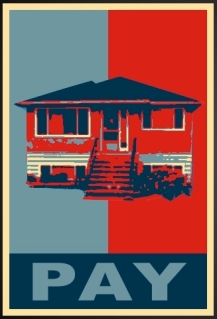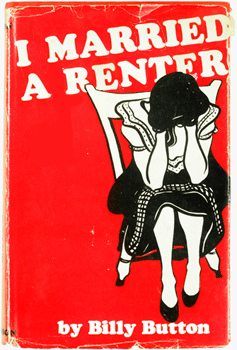“Greater Vancouver SFH average price
2011-12:$1,064,249 (+1.70% vs2010) <- dropped 13% since peak
2011-11:$1,134,936 (+8.80% vs2010)
2011-10:$1,162,349 (+9.80% vs2010)
2011-09:$1,104,896 (+8.70% vs2010)
2011-08:$1,162,242 (+16.3% vs2010)
2011-07:$1,133,357 (+20.4% vs2010)
2011-06:$1,215,265 (+24.9% vs2010)
2011-05:$1,223,421 (+28.1% vs2010) *Historical peak
2011-04:$1,204,587 (+20.0% vs2010) <-CMHC rule change”
– from a post by VMD at vancouvercondo info [1 Jan 2012 2:21pm], figures sourced from Larry Yatkowsky.
So, the triad is complete: rising inventory, decreasing sales… now, falling prices.
To paraphrase the numbers: The average purchaser of the average SFH in Greater Vancouver, over the last 12 months, has, on paper, already lost up to 13% of their purchase price, with a further loss of the closing and transfer fees.
Of course, all the usual caveats regarding using ‘average’ prices apply. Regardless, it is what it is, and, if the trend continues, we’ll start seeing YOY price drops. This will make a sub-group of market participants sit up and listen.
From a technical analysis perspective, the recent sharp up trend channel has thus been violated to the downside, moderately important TA support comes in at $1.0M, and $935K, with more crucial support at the 2008-2009 lows, about $740K (39% below the April 2011 peak). We expect that level to give way, likely after an anemic bounce, and expect the ultimate bear market bottom trough to be in the 50%-66%-off area. Sounds crazy to most, but, just watch.
– vreaa

































Well color me pink and chart me a graph so I can wag it at the RE bulls(hitheads) !
“So-called average prices aren’t a good gauge of what’s really going on in the real-estate market, according to a new report.
In “Averages & Anecdotes: Deciphering Trends in Real Estate Prices, Part I”, the Vancouver-based think-tank Urban Futures demonstrates how the most expensive sales prices skew data on how much most people are really paying, well, on average”
http://www.straight.com/article-395817/vancouver/average-home-prices-not-good-indicator-market-health
and in Vancouver the sky high west side skews the data enormously. Isn’t this why benchmark prices were established?
“in Vancouver the sky high west side skews the data enormously. Isn’t this why benchmark prices were established?”
That is true, maybe you should let all the economists at the RE associations know that so they would stop using those stats in the news.
“prices are down” is a marketing tool that vreaa just provided free advertising for. “prices are up” is another strategy. The only market that the real estate board does not like is a stable one.
There isn’t a market that the real estate board dislikes (publicly).
While we have not seen the benchmark prices released yet, the majority of this average price decline is coming from the mix. Van-West and Richmond (and to a lesser extent, West Van) are not selling at all now. This takes the average way down without really moving the benchmark (yet). In a falling market, this is what happens – volume slows and then prices drop. The “real” market is now much lower than where we are but many sellers are not going to accept lower prices immediately – so the market will not show itself for several months.
Thank you for this. Can I just repeat my earlier comment: I grew up in W Van in the 80s. To return after a 20-year absence and see the house prices in the area I’d lived in was like returning to a different planet, never mind different country. Again, if the example of Europe is anything to go by, expect to see sharp falls of 10-15% between now and end 2012, followed by much more mild declines – between 2 and 5% – in the three or four years following. Of course, in real terms the compound effect of the European experience has been 15+7+4+3 (allowing for compounding) or around 30%. My big, big caveat to this is Canada’s resource-driven economy in a resource-hungry world…
Vreaa, While I don’t disagree with your conclusions regarding where we end up, I don’t think TA applied to real estate is all that helpful. TA is usually used for short term stock trading and looks only at the price trends while consciously ignoring fundamentals and it could be argued that our local RE market is as disconnected as it is because of exactly that kind of analysis. Buyers here are clearly not looking at fundamentals and are instead looking only at price trends, chasing momentum not value.
RR -> Thanks for the comment. While fully admitting that TA is imperfect, we’d have to disagree with your main contention. It is a potentially useful tool to study almost any market, not just the stock market; and the fact that it doesn’t look at fundamentals makes it a useful complement to fundamental analysis.
TA is useful because it only looks at price action… it is better at getting at the psychology of the market than pure ‘value’ style analysis. It ‘black boxes’ the ‘reasons’ that players have for buying and selling, and tries to look purely at the buying and selling itself: the essence of it is that it identifies prices at which buyers and sellers have met in the past.
We’ve had a number of posts in the past looking at TA in the Vancouver context:
Five Charts: Predicting Future Vancouver Housing Prices
11 Sep 2010
Was that it? ‘The Top’? [Possibly]
12 Oct 2011
We do not, of course, recommend using TA alone to analyse the market.
Our primary reason for identifying Vancouver RE as being extremely overvalued is an analysis of the fundamentals.
As the first of those posts starts:
“Only a lunatic makes real estate sell or buy decisions based solely on charts, but, conversely, only a fool would say that past price action is irrelevant. Technical analysis (‘TA’) involves the study of chart patterns for clues to future price movement.”
Vreaa, your reasoning is normally wise and well-founded, and I share your view on the Vancouver RE market wholeheartedly. But in this particular instance, I must throw my vote in with Renters Revenge. Technical analysis appeals to our pattern-seeking instincts, but in my experience has no predictive merit whatsoever.
Markets are forward-looking. Patterns appear only in hindsight, and hence are of no use in forecasting. The fact that someone paid “x” for an asset in the past does not mean it will garner a similar price later; there are too many intervening factors that affect both the asset’s value and market participants’ disposition toward it.
The other point is that chart reading as a tool is available to everyone. So if it had value, prices would be bid up or down in advance of their predicted move, cancelling out the profits to be had. Has anyone predicted movements in Vancouver’s RE market (or in any market for that matter) based on past trends? If they’d been able to, the market would not have moved!
“There is no generally known method of chart reading that has been continuously successful for a long period of time. If it were known, it would be speedily adopted by numberless traders. This very following would bring its usefulness to an end.” — Benjamin Graham
I’ve always liked pretty charts… but I’ve also always thought that they were an abstraction too far (which is to say, of far less interest/validity than the actual, aggregated human narratives that they purport to portray)… I’ll stick with anecdote/narrative.
Definitely works for these guyz (among others).
http://tinyurl.com/7e8g8x3
I miss your postcards from the blast radius, I haven’t seen one in a while.
VREAA, TA for real estate finance is better applied to price relative to their cashflow, not price alone.
We may simply have to agree to disagree on all this (which is how many TA discussions go), which is fine.
Thoughts:
In my personal experience technical analysis adds significantly to fundamental analysis and contrarian-sentiment analysis, and improves ones predictive capacity when determining where markets are heading. That’s what it is all about: looking for an overall approach that gives one positive predictive capacity. Note, this doesn’t mean one has to be certain: if you can just improve your ability to predict markets above chance, you can do very well.
Some specific thoughts:
– Those of you who are dismissive of TA: Have you ever actually tried to use it? In my experience most people who disregard TA are people who have read a bit about it, or played with it a bit, but never tried to use it to inform their investment decisions systematically over years. (A closely related concept is that you meet many intelligent people who claim “you can’t make money in the stock market”… they’ve lost a bit or underperformed and then backed off to that nihilistic (and completely incorrect) conclusion).
– El Ninja is correct in one thing he/she implies: TA changes over time and becomes less useful when a majority of market players start applying certain classic concepts. For instance, there was a time when buying ‘breakouts’ reliably made profits… in recent years this became so widely used that it became less profitable, and ‘fading’ breakouts became a profitable play.
– buff_butler makes an additional point: You can add analysis of P/E ratio charts (and charts of other derived functions) to your TA quite successfully (be it for RE or stocks or other markets)… but basic price charts, interestingly, still contain useful patterns.
I have used TA for some day trades. Admittedly I am not that good at it, but I do use it to set up my stops and to time my entry. On net I am about even on my lifetime day trades – made some good ones but I have also suffered some dozies too. I have done much better on my buy and hold investments where I have completely ignored TA and just bought what I considered to be good value based on fundamentals. So I am not categorically opposed to TA for short term stock trading although I think people that do trade based purely on the chart view are crazy.
The biggest problem with using TA on real estate is the nature of the market:
1. Real estate units are very irregular; there are very few if any direct comparables vs stocks units which are excedingly consistent and easy to compare. High level averages for RE are interesting but they are easily outweighed by the individual specifics of the sales made within that average.
2. Real estate prices are extremely local (for example, very limited correlation between the price of a given unit in Richmond vs. North Surrey). Stocks are very centralized and the market is much much larger and this larger pool of prospective buyers and sellers creates greater opportunity for accurate price discovery. RE is more likely to transact way off the market averages, making the past price data less meaningful.
3. The RE market is extremely illiquid compared to the stock market. There are no market makers, transactions are infrequent, and the pool of buyers and sellers is constantly changing. This also hinders efficient price discovery.
4. The average hold for RE is infinitely longer than stocks and prices are set at the margins. Again, meaning that a few sales on the edge can seriously skew the averages both up and down.
As far as finding the bottom, I think that once the realization is made that prices are not rising, all of the momentum chasers will immediately switch to a fundamentals and value based decision making process. I don’t see anyone breaking out charts to decide how much to offer for that False Creek condo later this spring. What I can see them doing is asking how much rent they can get for it, and if that rent will cover the carrying costs and opportunity costs of their down payment. The only thing holding this market up is an accedotal understanding of price appreciation and when that expectation is gone, past prices will mean absolutely nothing.
RR -> Valid points. All of those factors add up to more ‘noise’ in RE charts, granted, but none completely negate the use of TA in the RE market. If a price has been fairly consistently derived over the years, there is still potentially something in the charts.
Can you see that there may be some validity?
For instance, the support levels of the 2008-2009 lows (nominally and in real terms) seem pretty important, wouldn’t you think?
One other thing. When you say “I don’t see anyone breaking out charts to decide how much to offer for that False Creek condo later this spring”, that by implication perpetuates a common fallacy, namely that TA only works because everybody watches the same charts (this is false). In fact there is an argument that it should work better in asset classes where people don’t watch the charts.
Vreaa, yes, I see some validity to the use of TA to understand the psychological barriers at certain price levels. However, I still don’t think TA applied to real estate captures the full psychological/emotional aspect of a rapidly reversing market. The run up here has been fueled only by an expectation of ever increasing prices, and we are currently well into overshoot territory (well past where TA would say we should have gone). Take the expectation of the current generally upward trendline away and I don’t think the prices from any prior time period have much bearing on the psychology at all. I don’t know if there is a single residential property in all of the GVA market that would cash flow positive at even 2008-2009 levels – and that is all that matters from a purely financial point of view. Investors are ignoring that problem now only because the recent uptrend has run so long and seems normal, not because of what that means technically. In a declining market, if a property does not cash flow positive, would you buy it because it reached 2008-2009 levels? I guess what I am saying is that I expect a significant overshoot to the negative once the sentiment changes, and the recovery from that overshoot would be closer aligned to fundamentals than it would be to any prior average price levels. I do not expect the recent lows to be a psychological barrier to further price declines.
Wow, we really are on different pages. That’s okay, though.
My experience is as an equity analyst, so I’ll frame my comments in that context.
To answer your question… no, I have not used TA, for the same reason I have not based my investment decisions on fortune tellers: there is zero empirical evidence that it works. Can you provide evidence to the contrary?
TA purports that trends can be spotted in advance, and that you can jump in or out or them profitably. This would require not only that you could foresee the future, but that you could act faster than every other profit seeker. For the average investor, this is mathematically impossible. Add to this transaction costs and the emotional pitfalls that arise with frequent trading, and one is worse off overall.
The reasons I think TA is still around are:
– It appeals to our pattern-seeking nature
– We rely on simplification to make sense of a complex world. This is a generally useful survival mechanism, but is folly in the world of investing
– We tend to overestimate our own predictive abilities and intellect
Plus the fact that TA is heavily marketed by brokerage firms, whose business relies on frequent trading. Fancy jargon like “momentum”, “head and shoulders”, and “triple cascade” are alluring.
Real estate is far less efficient and liquid than the stock market, which creates opportunities. But I don’t think past patterns in property prices will tell us how to find them. If they could, we simply would not see the dramatic price swings that we have witnessed here and elsewhere, because they would be arbitraged away.
In regards to Vancouver RE, you’ve pointed to the 2008 lows as a key “support” point. How exactly do you see this happening in practice? Let’s say you’re a prospective buyer, and prices this year approach 2008-09 levels. Are you going to jump in because that’s how much some other dude paid a few years ago? Or are prevailing interest rates, economic conditions, rental rates, personal circumstances, and a host of other forces going to dictate your decision?
by the same token, how has the TA worked out for you in RE? Then you should have used TA years ago to predict the run-up, you would be owning multiple properties by now, but not a landless blogger.
Sooooo many fallacies.
We all have them – we just dont want to admit having them.
fred -> Fair comment, but only applies for momentum players.
One can use TA in many ways: Some like to identify a trend and then hop on board (momentum players), others use it to identify turning points/support/resistance.
Anybody who uses a combination of fundamental analysis, contrarian/sentiment analysis and TA may well have stayed out of the Vancouver RE run-up completely.
In more liquid markets, momentum players set trailing stops and get out when uptrends are violated. Not so easy in RE.
For instance, the drop below $1.1M for Greater Vancouver average SFH took us below a very steep uptrend channel, but hard to press the sell button rapidly on a SFH in response.
BTW, through 2012, the less steep up-channel support from 2003 onwards comes in at $935K-$950K. TA would predict that, if that is violated to the downside, we could see a rapid fall to the 740K level. We could use this as a (admittedly ‘soft’) little test of TA, prospectively.
Also, we’d expect a bit of a bounce at 935-950, moreso at 740.
We’ll update a chart, for fun.
Has vreaa ever admitted to being landless? Just because someone is interested in the bubble-nomics of housing and is bearish on RE doesn’t mean they are a salivating renter waiting for just desserts.
I appreciate the use of TA as an indicator of how psychology is affecting the markets – because in my neck of the woods, the water cooler talk has been ominous now for a year and a bit, but people are still buying. Only these days it seems like with their fingers crossed, and a touch-wood-that-the-Chinese-will-keep-buying. It’s interesting to see that that negative talk might actually be having a market effect.
Of course, psychology is a tricky thing. Something COULD happen that would change things around again and there’d be another upsurge of irrational hope, but then tech analysis would show that, too.
To me it’s a good odometer of momentum now, but it doesn’t suggest that braking hard or accelerating again is impossible. Just statistically less probable.
((Happy New Year, VREAA! Thanks for all your hard work! ))
hear hear!
There seems to be a large disconnect between the numbers you quoted from Larry Yatkowski for Greater Vancouver and the numbers for Vancouver West Side from Sutton Group. In Van West, the average price for detached resale is up 20% to $2.8m for 2011, and a mind numbing +40% over December 2010. (Average detached resale for Van West was at approx $2.0m at Dec 2010). If both Larry’s and Sutton’s numbers for 2011 are correct, this means the market has become bifurcated between the West Side and the rest of Greater Vancouver. While this is not out of the realm of possibility, the large discrepency does seem odd.
Both sets of numbers are likely correct, yes, there has been a ‘narrowing’ of the market (IMHO, looks like a bifurcation, until the high end also implodes, then it’ll be seen to have been a narrowing).
The narrowing actually began far out, with the BC periphery beginning to implode first; recreational properties, etc, then Okanagan, parts of Vanc Island, Victoria, Whistler, outlying lower mainland, now all but one or two areas in Vancouver.
BTW, let’s continue this discussion in the next thread, with the added advantage of a chart: